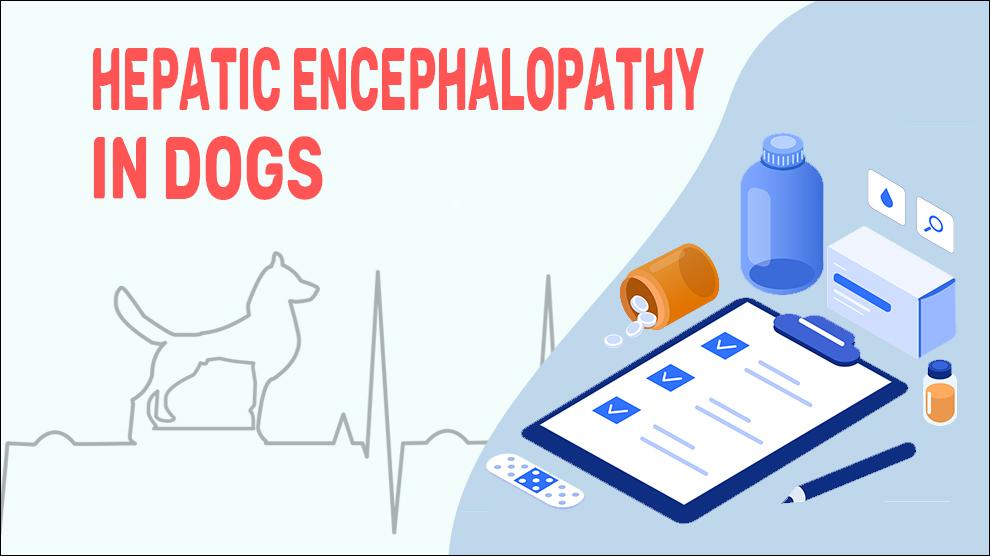Hepatic encephalopathy (HE) is a multifactorial neuropsychiatric condition due to the decline or messed-up function of the brain happening in dogs with progressed liver dysfunction.
Also called portosystemic encephalopathy (PSE), the exact pathophysiology of Hepatic encephalopathy is still unknown; the most accepted theory is centered on the job of neurotoxins, liver failure, and consequent metabolic changes causing weakened neurotransmission, changes in the blood/brain barrier, in brain energy metabolism and systemic inflammatory response.
HE causes a broad range of nonspecific psychiatric and neurological manifestations. It may be a sign of brain edema, brain atrophy, reversible metabolic encephalopathy, or a combination of any or all of these conditions. The methods of liver problems causing malfunction in the brain are still unidentified. Canine’s mental dysfunction is directly associated with liver failure due to the accumulation of toxins (particularly ammonia).
HE has a high mortality rate and a high risk of relapse if the underlying liver disease is not successfully treated. Almost 40% of dogs with liver cirrhosis have HE. HE typically begins with subtle psychomotor changes and this progress in coordination with the presence of somnolence, and asterixis ultimately leads to coma.
Symptoms Of Hepatic Encephalopathy
- Seizures and convulsions
- Walking in circles
- Pacing
- Staggering
- Aggression
- Drooling
- Compulsive behavior
- Apathy
- Hysteria
- Bloating or abdominal pain.
- Feelings of abdominal fullness.
- Lethargy
- Nausea and vomiting
- Excessive thirst / Urination
Treatment Options For Hepatic Encephalopathy
The specific treatment depends on the underlying cause of the liver failure. A definitive diagnosis can be done by taking a liver biopsy to determine the type and severity of the liver disease.
- Proper diagnosis is mandatory to figure out any underlying causes (Cushing’s disease).
- Nutritional and Intravenous fluid therapy will be given to help your dog not become severely dehydrated.
- If the cause of the disorder is due to any steroid medications, then ramping up the use of drugs is enough for the reversal of the disorder.
- Anti-diarrheic medications.
- Anti-inflammatory or immunosuppressant medications.
- Surgery may be required to treat some causes of liver malfunction, such as cancer or cysts, or vascular anomalies.
Home Remedies For Hepatic Encephalopathy
After being diagnosed with HE, it’s possible for pets to enjoy a good quality of life for years. Strictly follow the veterinarian's recommendations of any therapeutic diet or nutritional supplements to manage the condition.
Prevention Of Hepatic Encephalopathy
Hepatic encephalopathy etiology is not understood as of yet. The pets’ prognosis for healing will depend on the findings made by a veterinarian. Absolute recovery is based on proper diagnosis and removal of the cause of liver dysfunction. There are treatable conditions while some conditions will have to be managed with continuing medication. Owners should not forget the significant side effects.
Affected Breeds Of Hepatic Encephalopathy
There is no breed disposition. Bedlington Terrier, Cocker Spaniel, Chihuahua, Doberman Pinscher, Labrador Retriever, Maltese, Skye Terrier, Standard Poodle, Springer Spaniel, West Highland White Terrier
Additional Facts For Hepatic Encephalopathy
- Causes:
Causes of Acute Liver Failure:
- Autoimmune hepatitis
- Chemicals: Heavy metals, Arsenic, Carbon tetra chloride, Selenium, etc.
- Drugs: Acetaminophenoverdose, Amiodarone, Diazepam, methotrexate.
- Bacterial and viral Infections.
- Environment: Aflatoxins, Poisonous wild mushrooms, Blue-green algae toxins.
- Ischemic: Septic shock, Immune-mediated hemolytic anemia.
Causes of Chronic Liver Failure:
- Endocrine diseases: Cushing's Disease, Diabetes
- Canine hepatitis, Cholangiohepatitis.
- Cancer of the liver.
- Congenital abnormalities - Hepatic amyloidosis, Glycogen storage disease, Liver shunt.
- Liver cysts
- Exposure to toxic chemicals.
- Types:
HE may be congenital or acquired.
- Congenital HE: This is a hereditary irregularity in the liver and affected dogs are born with the condition.
- Acquired HE: This is a result of trauma, infections, and exposure to harmful chemicals and toxins.
- Mortality:
Hepatic encephalopathy is a multifactorial condition that includes a continuum or spectrum of diseases that ranges from a severe form of the disease with several symptoms and subtle conditions with no outward signs that can result in life-threatening complications.
- Diagnosis:
- Urinalysis and bloodwork
- Serum biochemistry profile
- Ultrasound
- MRI / CT scan
- Blood ammonia
- Blood tests to find out infections.
- Prognosis:
The prognosis for HE is really good for recovery. This is a life-threatening condition so rigorous treatment is usually necessary. Nevertheless, owners should understand that relapse is possible even after successful medical treatment in affected dogs.
When To See A Vet
It’s better to set up an appointment with your veterinarian if you notice -
- Seizures and convulsions
- Walking in circles
- Pacing
Food Suggestions For Hepatic Encephalopathy
- Low fat, high protein foods - Lean ground turkey, fresh cod, eggs, cooked chicken, or organ meats.
- Add lots of veggies (green beans, sweet potatoes, spinach, broccoli, and beets especially).
- Protein - Lean chicken breast, lean beef, pork liver, canned tuna fish / wild-caught sardines, and mackerel.
- Vitamin C foods - Strawberries, citrus fruits, potatoes, tomatoes.
- Antioxidants - Blueberries, Cauliflower, Beets, Beans, etc.
- Flavonoids - Blueberries, blackberries, cranberries, eggplant, etc.
- Beta carotene foods - Orange, yellow, and green leafy vegetables and fruits(such as carrots, tomatoes, spinach, lettuce, cantaloupe, broccoli, etc).
Conclusion
Hepatic encephalopathy-affected dogs should be regularly monitored for liver functionality to ensure prompt treatment if there are any changes.
The prognosis for HE is volatile and is dependent mainly on the actual cause.
In most cases, this condition never reveals any external symptoms but may suffer unimpeded liver function; few other dogs may develop progressive liver dysfunction.

















